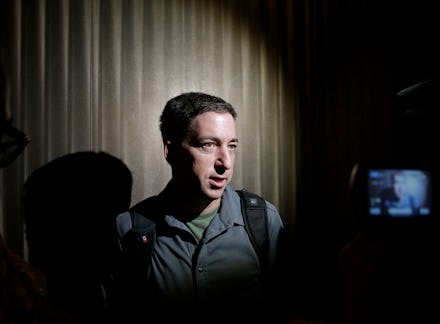99% Of Edward Snowden's Secret Files Still Haven't Been Published

The news: On Tuesday, Guardian editor Alan Rusbridger revealed that the UK news outlet has only published 1% of the information it received from American whistleblower Edward Snowden regarding the NSA's domestic surveillance program.
At a parliamentary inquiry, Rusbridger said that the former NSA contractor leaked about 58,000 documents to the Guardian, of which only 26 having been published.
While this may seem like a terrifying prospect for the American and British intelligence communities, Rusbridger said he would "not expect us to be publishing a huge amount more," and that any further releases would be handled with caution. "We're not going to be put off by intimidation, but nor are we going to behave recklessly," he told the parliamentary committee.
The background: Though Snowden has fled to Russia since the Guardian first published his leaks in September, Rusbridger has been in the middle of a political maelstrom in the UK. Both American and British governments have accused the Guardian of compromising the security of their intelligence operations. Some conservative British lawmakers even suggest that the media outlet should be prosecuted for committing terrorist acts.
In turn, Rusbridger has accused the British government of intimidating the press. At the inquiry, he recalled how he and Glenn Greenwald, the journalist who worked with Snowden on releasing the files, was threatened by law enforcement, and how Greenwald's partner was detained at Heathrow Airport. (Greenwald has since left the Guardian and started his own venture.)
Popular opinion may be on Rusbridger's side. He has the backing of the Reporters Committee for Freedom of the Press, with prominent media outlets such as the New York Times, the Washington Post, and the Associated Press voicing their support. The leaks have also prompted a UN investigation, and Ben Emmerson, the counterterrorism official in charge, seems to fully be in support of the Guardian.
"The astonishing suggestion that this sort of journalism can be equated with aiding and abetting terrorism needs to be scotched decisively," he wrote in a piece for the Guardian yesterday.
The takeaway: Though Rusbridger has not elaborated on the rest of the files, the American and British intelligence communities may have another headache coming. If just 1% of the information was enough to induce an international fiasco, then the NSA cannot really afford any more security breaches.
But Rusbridger said that while the leaks may be embarrassing to the U.S. and UK, the Guardian has not actually compromised national security, and it never will.
"We have published no names and we have lost control of no names," he told the parliamentary inquiry. "So we have made very selective judgments about what to print."
So stay tuned for more information on how the government is spying on your porn-viewing habits.